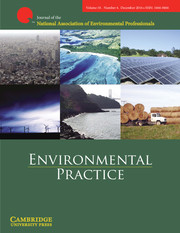Article contents
NEPA in the Agencies: A Critique of Current Practices
Published online by Cambridge University Press: 18 August 2005
Abstract
The National Environmental Policy Act (NEPA) has been federal law since 1970. Relatively little attention, however, has been paid to how NEPA is actually implemented by the more than 80 federal departments and agencies that plan or permit activities subject to NEPA's requirements. The authors conducted a comparative study of the NEPA process as implemented by 12 different federal agencies. The study found that the authority of the officials responsible for NEPA and the scope of their duties vary considerably from one agency to another. Nevertheless, several general observations and conclusions emerged from the study. Collectively, agency NEPA officials face increasing workloads; however, most of the NEPA offices studied have incurred reductions in both their budget and staff positions in recent years. In part due to these constraints, most agency headquarters NEPA offices lack a national tracking system to monitor the numbers or types of NEPA documents that their agency produces. In none of the 12 agencies studied did NEPA emerge as the principal cause of excessive delays or costs; however, NEPA compliance officers frequently cited needs for additional guidance and training in the analysis of cumulative and indirect effects and for more specific guidance on the appropriate level of analysis. Several agencies have developed elements of what could be called “NEPA Best Practices,” but no formal process exists for sharing these practices with other federal agencies. The authors present recommendations based on these findings that are intended to address significant issues and contribute to improving the NEPA process.
Information
- Type
- Brief Report
- Information
- Copyright
- © 2003 National Association of Environmental Professionals
- 5
- Cited by

